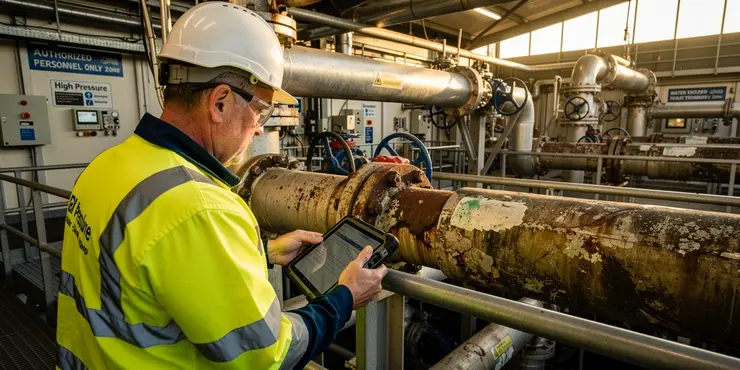
Find Help
More Items From Ergsy search
-
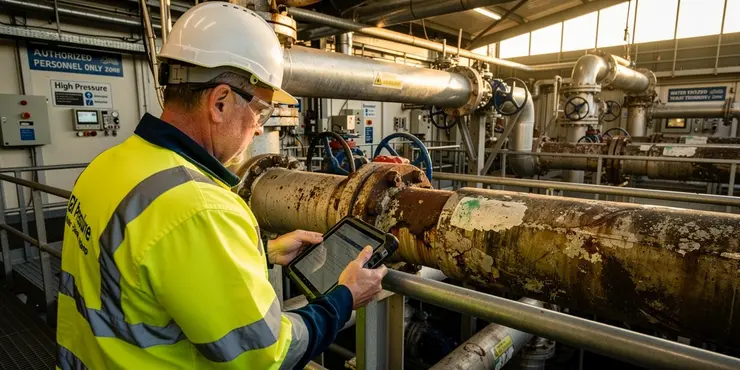
What challenges do water companies face in maintaining infrastructure?
Relevance: 100%
-
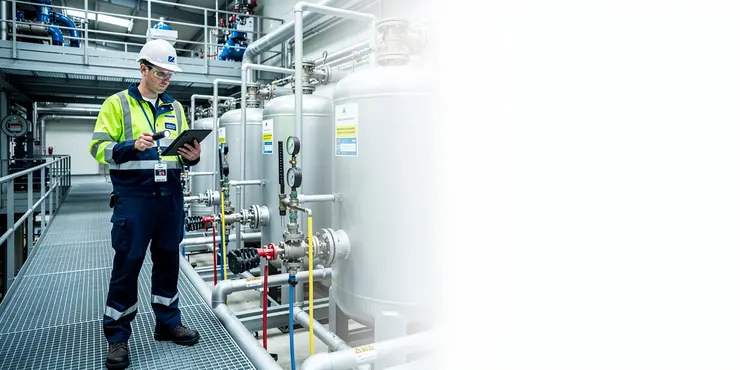
Are water companies responsible for maintaining water infrastructure in the UK?
Relevance: 93%
-
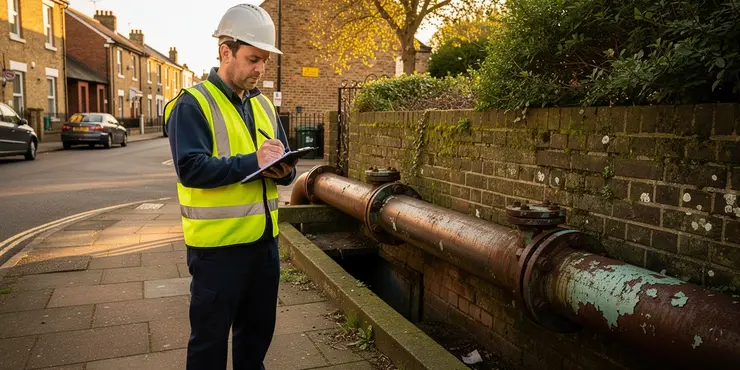
Are water companies responsible to maintain and update infrastructure in the UK?
Relevance: 91%
-

Are there penalties for not maintaining water infrastructure?
Relevance: 79%
-

Do water companies have to update the infrastructure?
Relevance: 77%
-

How do water companies fund infrastructure updates?
Relevance: 72%
-
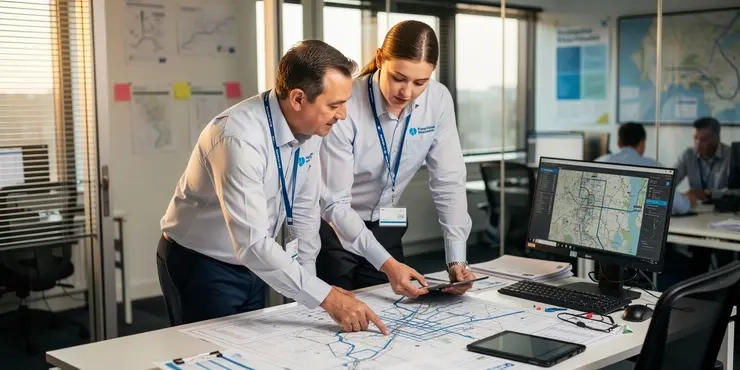
Do water companies have long-term infrastructure plans?
Relevance: 72%
-

How are infrastructure priorities determined by water companies?
Relevance: 71%
-

How transparent are water companies regarding infrastructure improvements?
Relevance: 70%
-

How old is the water infrastructure in the UK?
Relevance: 60%
-
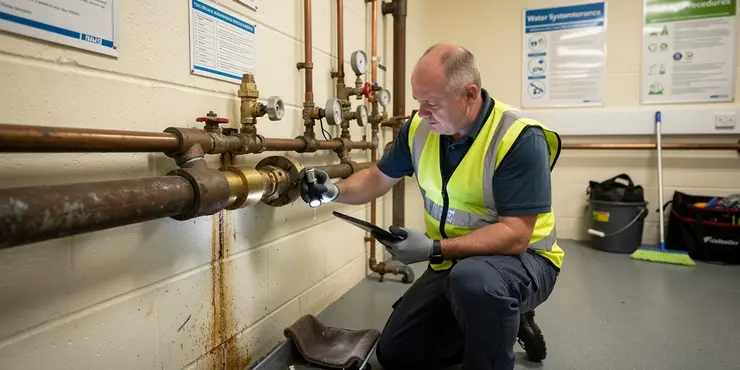
Why is it challenging to fix water leaks in the UK?
Relevance: 57%
-
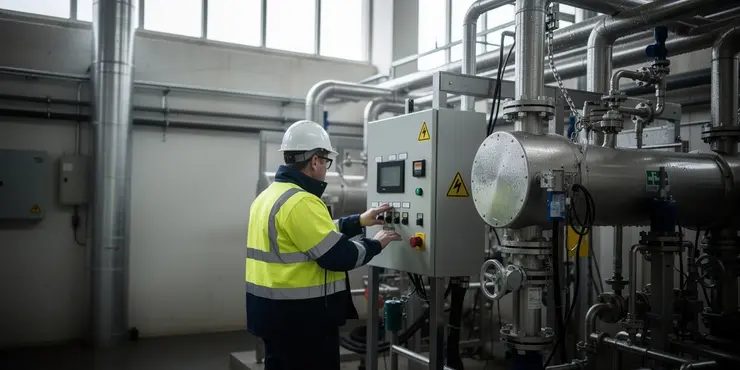
What does water infrastructure maintenance involve?
Relevance: 57%
-

How much water is lost in the UK through poor infrastructure?
Relevance: 57%
-
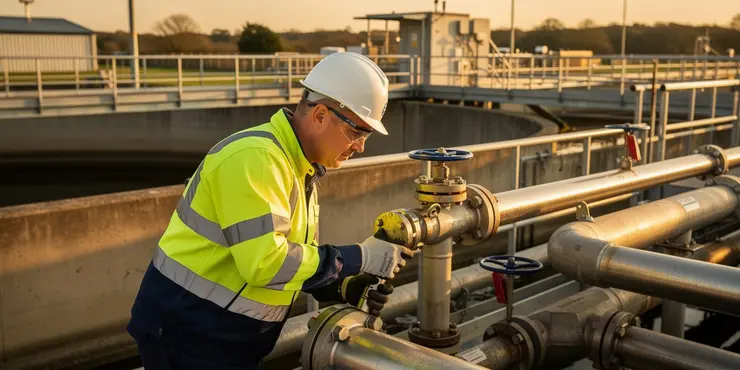
What role do water companies play in sewage pollution?
Relevance: 53%
-

Are there initiatives to improve water efficiency in infrastructure?
Relevance: 53%
-

Can customers report issues with water infrastructure?
Relevance: 52%
-
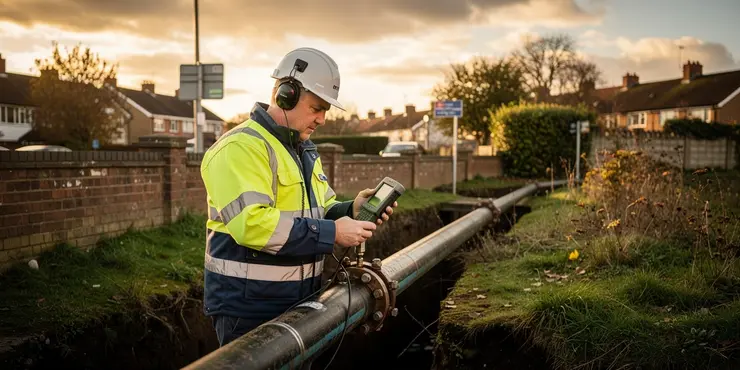
How do water companies detect leaks?
Relevance: 51%
-

How are water companies held accountable for infrastructure maintenance?
Relevance: 49%
-

How does climate change affect water infrastructure maintenance?
Relevance: 49%
-

Are there penalties for water companies besides issuing refunds?
Relevance: 48%
-

How will refunds affect investments towards improving water infrastructure?
Relevance: 48%
-

Which UK water companies are going to refund their customers for poor performance?
Relevance: 48%
-

Which UK water companies are going to refund their customers?
Relevance: 45%
-

Who regulates the performance and compliance of UK water companies?
Relevance: 45%
-

Do these refunds mean water companies have increased their rates fraudulently?
Relevance: 45%
-

What are the financial implications of water loss for the UK?
Relevance: 43%
-

Can water companies enter my property to enforce a hosepipe ban?
Relevance: 43%
-

When will the refunds be issued by the UK water companies?
Relevance: 43%
-
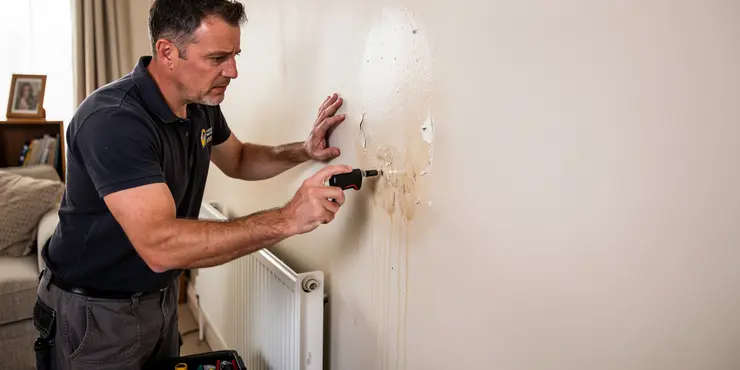
What are common signs of leaks in water infrastructure?
Relevance: 42%
-

How much is being refunded in total by the UK water companies?
Relevance: 42%
-

What criteria were used to determine the refunds for UK water companies?
Relevance: 42%
-

Which body is responsible for enforcing refunds by UK water companies?
Relevance: 41%
-

Are there any government initiatives to tackle water loss in the UK?
Relevance: 41%
-

How many UK water companies are involved in the refund process?
Relevance: 40%
-

Where can customers find updates on their water company's performance standards?
Relevance: 40%
-

Are customers responsible for any part of the water infrastructure?
Relevance: 40%
-

What measures are being taken to address water loss in the UK?
Relevance: 40%
-

Can customers appeal or discuss the refund amount with their water company?
Relevance: 39%
-

What can I do if the water company doesn’t respond to my claim?
Relevance: 39%
-

What causes water loss in the UK?
Relevance: 38%
Introduction
Water companies in the UK face a myriad of challenges in maintaining infrastructure that ensures the supply of clean and safe water to homes and businesses. The complexity of the infrastructure, which includes thousands of kilometers of pipes, treatment plants, reservoirs, and pumping stations, requires constant monitoring and maintenance. This task is made even more challenging due to various factors, including ageing infrastructure, climate change, financial constraints, and regulatory pressures.
Ageing Infrastructure
One of the primary challenges is the ageing infrastructure. Many of the UK's water mains and sewers are over a century old and are prone to leaks and bursts. Replacing or repairing these ageing pipes requires significant investment and careful planning to minimize disruption to customers. Water companies must balance the need for updates with the constraints of their budgets and time, which can be a difficult task given the extent of the network.
Climate Change
Climate change poses another significant challenge. The increasing frequency and severity of extreme weather events, such as floods and droughts, put additional pressure on the water infrastructure. Companies must adapt their networks to cope with these changes, ensuring they can continue to provide reliable services. This includes investing in flood defenses and implementing sustainable drainage systems to manage stormwater effectively.
Financial Constraints
Financial constraints are a persistent challenge for water companies. Significant investments are needed to maintain and upgrade infrastructure, but these must be balanced with the need to keep customer bills affordable. Regulatory bodies like Ofwat control how much water companies can charge, which can limit the funds available for essential maintenance and upgrades. Companies must find innovative solutions to optimize their resources and achieve necessary improvements within these financial limitations.
Regulatory Pressures
Water companies operate under strict regulatory scrutiny in the UK, with Ofwat setting performance targets and imposing penalties for non-compliance. These regulations are designed to ensure companies maintain infrastructure effectively and deliver high-quality services to customers. However, meeting these regulatory requirements while dealing with other challenges can be difficult, necessitating strategic planning and efficient operations.
Technological Advancements
Keeping up with technological advancements is both a challenge and an opportunity. New technologies can improve infrastructure monitoring and maintenance efficiency, such as using sensors and data analytics to detect leaks and optimize repairs. However, implementing these technologies requires investment and can be complex to integrate into existing systems.
Conclusion
In conclusion, UK water companies face significant challenges in maintaining infrastructure, including ageing systems, climate change impacts, financial constraints, and regulatory pressures. While these challenges are formidable, they also drive innovation and improvements in infrastructure management. Successfully navigating these challenges is essential to ensuring the continued supply of safe and reliable water across the UK.
Introduction
Water companies in the UK have a big job. They make sure clean and safe water gets to our homes and workplaces. They use lots of pipes, treatment plants, and pumps. These need to be watched and fixed all the time. This is hard because the pipes and systems are old. Weather is changing, and there isn't always enough money. The rules they must follow make it even harder.
Ageing Infrastructure
The pipes that carry our water are very old. Many were put in over 100 years ago. They can break and leak. Fixing or changing these pipes costs a lot of money and time. Water companies have to plan carefully to not upset customers. It’s hard because there are so many pipes to look after and not much money to do it with.
Climate Change
Weather is changing, and this is a big problem. There are more floods and dry spells. These can hurt the water systems. Companies need to change things to handle this. They need to build flood walls and make sure water drains away properly.
Financial Constraints
Money is a big worry. Fixing and improving water systems costs a lot. But companies can't charge customers too much money. There are rules about how much they can charge. This means they have to be smart with their money and find new ways to fix things.
Regulatory Pressures
There are rules about how water companies must work. These rules make sure companies give us good service. They also have targets to hit and can get in trouble if they don't. Following these rules is hard when there are so many other problems to deal with. Companies need good plans and to work well to meet these rules.
Technological Advancements
New technology is both a problem and a help. It can help find leaks and fix things faster. Things like sensors and computer data can help keep the water flowing. But getting these new tools costs money and time. It can also be tricky to fit them into old systems.
Conclusion
UK water companies have lots of problems in keeping the water flowing. Old pipes, weather changes, money issues, and rules all make it tough. But these problems also push them to find better ways to do things. Solving these problems means we will keep having clean and safe water to use.
Frequently Asked Questions
What are the common challenges water companies face with aging infrastructure?
Aging infrastructure often leads to increased maintenance costs, frequent breakdowns, and inefficiencies that can affect water distribution and quality.
How do water companies handle leaks in their systems?
Water companies use technologies like smart sensors and regular pipeline inspections to detect leaks early and minimize water loss.
Why is funding a challenge for water infrastructure maintenance?
Securing adequate funding can be difficult due to budget constraints, competing priorities, and the high costs associated with large-scale infrastructure projects.
How does climate change impact water infrastructure maintenance?
Climate change can increase the frequency and severity of extreme weather events, causing damage to infrastructure and complicating maintenance efforts.
What role does technology play in maintaining water infrastructure?
Technology aids in monitoring systems, automating controls, detecting issues earlier, and improving overall system efficiency and reliability.
How do water companies address outdated technology in their infrastructure?
They invest in upgrades and modernization of systems, often incorporating advanced technologies to improve efficiency and reliability.
What regulatory challenges do water companies face?
Compliance with evolving regulations requires adapting infrastructure and processes, which can be costly and technically challenging.
How do water companies ensure water quality in aging systems?
Routine testing, upgrades to treatment processes, and maintaining a robust monitoring system are critical for ensuring water quality.
What is the impact of population growth on water infrastructure?
Population growth increases demand, which may exceed the capacity of existing infrastructure, necessitating expansion and upgrades.
How do natural disasters affect water infrastructure maintenance?
Natural disasters can damage infrastructure, disrupt services, and require extensive and costly repairs.
What staffing challenges do water companies encounter?
There is often a shortage of skilled workers and engineers needed to maintain and upgrade complex water systems.
How does urbanization affect water infrastructure?
Urbanization requires expanding services to accommodate growth, often straining existing systems and necessitating substantial investment.
Why is asset management important for water companies?
Effective asset management helps in optimally prioritizing maintenance, extending the lifespan of infrastructure, and reducing costs.
What financing options are available for water infrastructure projects?
Options include government grants, public-private partnerships, bonds, and tariff revenues.
How do water companies manage increased operational costs?
They improve efficiency, invest in technology, and sometimes increase rates to cover rising costs.
What challenges do water companies face in rural areas?
Rural areas often face higher costs per user for infrastructure maintenance due to low population density and difficult access.
How does corrosion affect water infrastructure?
Corrosion can lead to leaks, contamination, and reduced efficiency, necessitating costly repairs or replacements.
What are the challenges in maintaining underground pipelines?
Challenges include difficulty in inspection, higher repair costs, and potential for significant disruption during repairs.
Why is public awareness important for water infrastructure maintenance?
Public support can lead to more sustainable funding and help reduce misuse or wastage, leading to better management of resources.
How do water companies tackle water theft and illegal connections?
They implement stringent monitoring systems, legal actions, and community education programs to reduce such incidents.
What problems do water companies have with old pipes and systems?
Water companies often deal with old pipes and systems. These old parts can cause problems.
Here are some common problems:
- Old pipes can leak and waste water.
- Fixing old parts can take a lot of time and money.
- It can be hard to find new parts for old systems.
- Old pipes might break and stop the water from coming.
These problems can cause a lot of trouble.
Using simple pictures or videos can help understand these issues better. Talking to someone who knows about water systems can also be helpful.
Old pipes and systems can break down more often and cost more to fix. This can cause problems with getting clean water to people.
How do water companies fix leaks in their pipes?
Water companies take care of leaks in their pipes by finding where the leaks are and fixing them.
They use special tools to listen for water sounds. This helps them find leaks that are hard to see.
After finding a leak, workers dig up the ground to reach the broken pipe.
Then, they fix or replace the broken part of the pipe so it can work well again.
Water companies check their pipes often. This helps to stop leaks before they become big problems.
Water companies use special tools to find leaks quickly and stop water from being wasted. They use smart sensors and check the pipes often.
Why is it hard to get money to fix water pipes and systems?
Getting enough money to fix water pipes and systems is hard. Here are some reasons:
- Water pipes are big and cost a lot to fix.
- Some places do not have enough money budgeted for repairs.
- People may not want to pay more for their water bill.
- It is hard to see these problems because pipes are underground.
Here are some ways to learn more:
- Ask someone to explain more about water pipes.
- Watch videos about how water systems work.
- Use pictures and drawings to understand better.
Getting enough money for big projects can be hard. This is because there is not always enough money, and there are other important things that need money too. Big projects can cost a lot, making it tough to find the money needed.
How does climate change affect taking care of water systems?
Climate change can affect how we take care of water systems, like pipes, dams, and treatment plants. Here are some things that can happen:
- More rain and storms: This can make it hard for water pipes and drains to work properly. They can overflow or break.
- Hotter temperatures: Heat can dry up water sources, making it harder to get water.
- Sea level rise: Rising water can damage systems near the coast.
To help, we can:
- Check systems often to make sure they are working.
- Fix any problems quickly.
- Use tools like alarms to warn us if something is wrong.
Climate change can make bad weather happen more often and be stronger. This can break roads, buildings, and other things we use. It also makes it harder to fix them.
How does technology help take care of water systems?
Technology helps us look after water pipes and clean water.
Things like computers and smart tools can find leaks in pipes.
Technology also helps us clean water so it is safe to drink.
Pictures and videos can help you understand more about it.
Asking questions and using apps can also give you more information.
Technology helps us check how things are working. It can make machines run by themselves. It finds problems early and makes everything work better and more reliably.
What do water companies do about old technology in their systems?
They spend money to make new and better systems. They use smart technology to work faster and more safely.
What problems do water companies have with rules?
Water companies have to follow many rules. Sometimes, these rules can be hard to follow. Here are some ways to help understand these problems:
- Break information into small steps.
- Use pictures or charts to help explain ideas.
- Ask someone to explain if something is confusing.
Following new rules means changing how we do things, which can cost lots of money and be hard to do.
How do water companies make sure water is clean in old pipes?
We need to check the water often to make sure it is clean.
We also need to use new and better ways to clean the water.
Having a strong system to watch the water helps keep it safe to drink.
How does more people affect water systems?
More people need more things, like roads and houses. Sometimes, there aren't enough. We have to make more and fix old ones.
How do natural disasters change how we take care of water pipes and systems?
Big natural events like floods and earthquakes can break important stuff like roads and buildings. This can stop things like buses and phones from working. Fixing everything can take a lot of time and money.
What problems do water companies have with workers?
Water companies sometimes have trouble finding enough people to work for them. Here are some things that can help:
- Job Training: Teach workers new skills so they can do different jobs.
- Tools for Learning: Use videos and pictures to explain jobs and tasks.
- Help from Schools: Work with schools to find young people who want to learn about water jobs.
These ideas can help water companies find the workers they need.
There are not enough skilled workers and engineers. We need them to help fix and make better the water systems. These water systems are complex, which means they are very hard to understand or work on.
What happens to water systems when cities grow bigger?
Cities are getting bigger and need more services. This can be hard because it can make current services struggle to keep up and need a lot of money to fix.
Why is taking care of things important for water companies?
Water companies need to look after their things, like pipes and pumps. This helps them give us clean water and fix problems quickly. Taking care of these things saves money and keeps water safe to drink.
If something breaks, workers can use plans to fix it fast. Special tools can help them watch and check these things to make sure they work well.
Getting everyone together to talk and share ideas can help, too.
Looking after things well helps decide what needs fixing first, makes things last longer, and saves money.
How can we pay for water projects?
Here are some ways to pay for water projects:
- Ask the bank for a loan.
- Get help from the government.
- Talk to companies that want to invest money.
- Use funds from special groups that support water projects.
- Raise money from the community.
Tools to help:
- Ask someone to read with you.
- Use a dictionary to learn new words.
- Listen to audio versions if available.
Ways to get money are:
- Help from the government (grants)
- Working together with companies and the government (public-private partnerships)
- Borrowing money (bonds)
- Money from charges or taxes (tariff revenues)
Using simple charts or pictures can help understand these ideas better.
How do water companies handle more costs?
What can water companies do?
- **Plan Ahead**: Water companies can make a plan to save money. - **Use Technology**: They can use special tools to find problems quickly. - **Train Workers**: Teaching workers new skills helps them work better.Need Help?
- Use pictures or videos to understand better. - Ask someone to explain tricky words.They help things work better, buy new technology, and sometimes raise prices to pay for higher costs.
What problems do water companies have in the countryside?
Water companies in the countryside have some problems. Here are a few:
- It's hard to reach some homes because they're far away.
- There can be less rain, so there's not much water.
- Fixing pipes and pumps can take a long time.
- It's costly to clean water and make it safe.
Here's how we can help:
- Use pictures and signs to help explain things.
- Use simple words to talk about water and pipes.
- Talk slowly and ask people if they have questions.
Rural areas are places in the countryside. It costs more money to take care of roads and services there. This is because not many people live there and it is hard to get to these places.
What happens to water pipes when they rust?
Rust can cause things to leak, get dirty, and not work well. This can make fixing or buying new things very expensive. To help, you can use simple tools like pictures and videos to understand better.
What makes it hard to take care of pipes under the ground?
Here are some reasons why taking care of underground pipes can be tricky:
- It's hard to see them because they are under the ground.
- Fixing them can take a long time.
- They can break if the ground moves or if there is bad weather.
- Special machines are needed to look after them.
Tools that can help:
- Maps can show where the pipes are.
- Cameras can go inside pipes to check them.
- Listening devices can hear if a pipe is leaking.
There are some problems including:
1. It's hard to check things.
2. Fixing things can cost a lot of money.
3. Jobs to fix things might cause a lot of trouble.
To help understand, you can use pictures or simple videos. Also, asking a friend or using a dictionary can help with hard words.
Why is it important for people to know about water systems?
It is important for people to know about water systems because:
- They help deliver clean water to our homes.
- They keep our environment clean by managing waste water.
- If they break, it can cause big problems, like leaks or floods.
- Knowing about them can help us take care of them better.
Here are some ways to learn more:
- Watch videos about how water systems work.
- Visit a local water plant to see how it’s done.
- Ask questions and learn from experts.
When people help, it can make money last longer and stop waste. This means we can use things better.
How do water companies stop water stealing and illegal hookups?
Water companies work to stop stealing and illegal connections. They look for where water is being taken. They check meters and pipes to find problems. They use special tools and cameras to help them see if anything is wrong.
Teams fix any broken pipes or illegal spots. Companies tell people the right way to connect to water. If someone stole water, they might have to pay a fine.
If you need help reading, you can use pictures or ask someone to explain. Reading tools or apps can read out loud to you. This makes it easier to understand.
They use strong ways to watch and stop bad things from happening. This includes having rules, taking people to court if they break rules, and teaching people in the community.
Useful Links
This website offers general information and is not a substitute for professional advice.
Always seek guidance from qualified professionals.
If you have any medical concerns or need urgent help, contact a healthcare professional or emergency services immediately.
Some of this content was generated with AI assistance. We’ve done our best to keep it accurate, helpful, and human-friendly.
- Ergsy carfully checks the information in the videos we provide here.
- Videos shown by Youtube after a video has completed, have NOT been reviewed by ERGSY.
- To view, click the arrow in centre of video.
- Most of the videos you find here will have subtitles and/or closed captions available.
- You may need to turn these on, and choose your preferred language.
- Go to the video you'd like to watch.
- If closed captions (CC) are available, settings will be visible on the bottom right of the video player.
- To turn on Captions, click settings .
- To turn off Captions, click settings again.
More Items From Ergsy search
-

What challenges do water companies face in maintaining infrastructure?
Relevance: 100%
-

Are water companies responsible for maintaining water infrastructure in the UK?
Relevance: 93%
-

Are water companies responsible to maintain and update infrastructure in the UK?
Relevance: 91%
-

Are there penalties for not maintaining water infrastructure?
Relevance: 79%
-

Do water companies have to update the infrastructure?
Relevance: 77%
-

How do water companies fund infrastructure updates?
Relevance: 72%
-

Do water companies have long-term infrastructure plans?
Relevance: 72%
-

How are infrastructure priorities determined by water companies?
Relevance: 71%
-

How transparent are water companies regarding infrastructure improvements?
Relevance: 70%
-

How old is the water infrastructure in the UK?
Relevance: 60%
-

Why is it challenging to fix water leaks in the UK?
Relevance: 57%
-

What does water infrastructure maintenance involve?
Relevance: 57%
-

How much water is lost in the UK through poor infrastructure?
Relevance: 57%
-

What role do water companies play in sewage pollution?
Relevance: 53%
-

Are there initiatives to improve water efficiency in infrastructure?
Relevance: 53%
-

Can customers report issues with water infrastructure?
Relevance: 52%
-

How do water companies detect leaks?
Relevance: 51%
-

How are water companies held accountable for infrastructure maintenance?
Relevance: 49%
-

How does climate change affect water infrastructure maintenance?
Relevance: 49%
-

Are there penalties for water companies besides issuing refunds?
Relevance: 48%
-

How will refunds affect investments towards improving water infrastructure?
Relevance: 48%
-

Which UK water companies are going to refund their customers for poor performance?
Relevance: 48%
-

Which UK water companies are going to refund their customers?
Relevance: 45%
-

Who regulates the performance and compliance of UK water companies?
Relevance: 45%
-

Do these refunds mean water companies have increased their rates fraudulently?
Relevance: 45%
-

What are the financial implications of water loss for the UK?
Relevance: 43%
-

Can water companies enter my property to enforce a hosepipe ban?
Relevance: 43%
-

When will the refunds be issued by the UK water companies?
Relevance: 43%
-

What are common signs of leaks in water infrastructure?
Relevance: 42%
-

How much is being refunded in total by the UK water companies?
Relevance: 42%
-

What criteria were used to determine the refunds for UK water companies?
Relevance: 42%
-

Which body is responsible for enforcing refunds by UK water companies?
Relevance: 41%
-

Are there any government initiatives to tackle water loss in the UK?
Relevance: 41%
-

How many UK water companies are involved in the refund process?
Relevance: 40%
-

Where can customers find updates on their water company's performance standards?
Relevance: 40%
-

Are customers responsible for any part of the water infrastructure?
Relevance: 40%
-

What measures are being taken to address water loss in the UK?
Relevance: 40%
-

Can customers appeal or discuss the refund amount with their water company?
Relevance: 39%
-

What can I do if the water company doesn’t respond to my claim?
Relevance: 39%
-

What causes water loss in the UK?
Relevance: 38%


